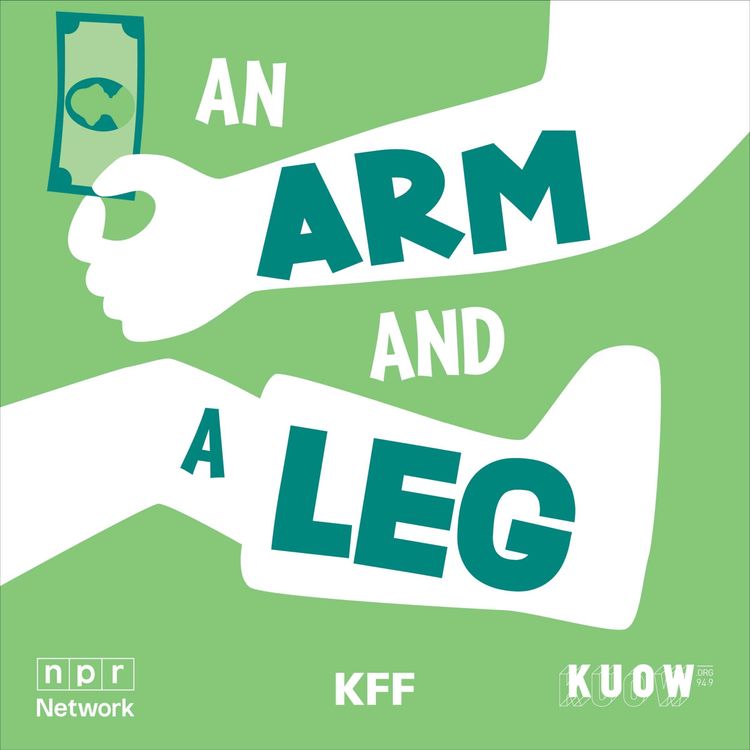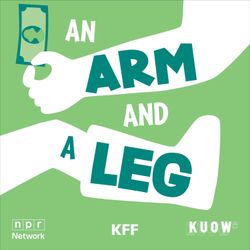Share

An Arm and a Leg
We’re digging into “facility fees.” We need your help.
We’re launching a brand new project and need your help!
We’re zooming in on charges that are becoming more and more common on your medical bills: facility fees.
Facility fees are charges tacked onto your bill for visiting a doctor’s office or clinic related to a hospital or larger health care system… or even talking with a doctor who’s in one of those places on a telehealth visit.
If you’ve ever seen a charge for a facility fee on your medical bill, we want to hear from you.
... and if you haven't, we'd love your help spreading the word!
Consider sharing our posts on any of these networks:
Instagram | TikTok | Facebook | Ex-Twtitter | LinkedIn
We’ll be back with more new episodes in a few weeks.
In the meantime, send your stories and questions. Or call 724 ARM-N-LEG.
And of course we’d love for you to support this show.
More episodes
View all episodes

1. The ‘Shkreli Awards’ — for dysfunction and profiteering in health care
25:26||Season 13, Ep. 1You remember a guy named Martin Shkreli? If his name rings a bell, it’s probably because back in 2015, he jacked up the price of an old drug — from around $13 a pill to $750. The media dubbed him “the pharma bro,” and he became a symbol of brazen pharmaceutical greed. Now, he’s the namesake for the Shkreli Awards — a kind of Oscars for the most outrageous examples of greed, fraud, and general brokenness in American health care. Every year, a health care think tank called the Lown Institute ranks the top ten worst stories and holds an award ceremony to “honor” the winners. We’re bringing you highlights from this year’s ceremony – featuring things like human bones for sale without the consent of the deceased or their families, phantom urinary catheters, and so much more – and some reflections from the Lown Institute’s president, Dr. Vikas Saini. “Showing all these stories together paints a picture of a health care system in desperate need of transformation,” Saini said at the ceremony. “Not just because the stories are shocking, but because often what they're depicting, like Martin Shkreli's infamous price hike, is perfectly legal.” Here’s a transcript of this episode. Send your stories and questions. Or call 724 ARM-N-LEG.Of course we’d love for you to support this show.
This is An Arm and a Leg
00:57|An Arm and a Leg is a show about why health care costs so freaking much, and what we can (maybe) do about it. New episodes every three weeks.
10. A listener fighting the good fight
11:47||Season 12, Ep. 10A few weeks ago, a listener sent us a note with a link to a news article about a new resolution that had recently been adopted by the American Medical Association – the largest group representing doctors in the US. The resolution said: hospitals need to do more to guarantee charity care to patients who qualify. Legislators and regulators should make them. Our listener was the author of that resolution, and he told us he first learned about charity care through this podcast. His name is Joey Ballard and he’s an internal medicine resident at the University of Illinois-Chicago (UIC).We talked with him about his early organizing as a medical student, bringing the resolution to the AMA, and the optimism he feels bringing the fight for charity care to the hospital he works at now.Here’s a transcript of this episode. Send your stories and questions. Or call 724 ARM-N-LEG.And again... we’d love for you to support this show.
9. Revisiting ‘Christmas In July’
27:19||Season 12, Ep. 9Today we’re revisiting one of our favorite episodes from the archive – a story about giving – and bringing you an update. In 1980, a young father named Denny Buehler was battling leukemia and needed to travel from Cincinnati to Seattle for treatment. To raise the money, his friends and family threw a softball tournament. Denny passed away a few months later. But his friends and family turned the softball tournament into a beloved tradition, and a chance to give back. For more than 40 years, they’d host the games and sell hot dogs to raise money for people in the area who needed help with medical expenses. Then in 2019, the Denny Beuhler Memorial Fund found a way to make the money they’d fundraise go a hundred times farther. Literally. Inspired by a segment on Last Week Tonight, they partnered with a group to buy up old medical debt – and erase it. Now in 2024, that group – now known as Undue Medical Debt – has grown its influence and helped crush billions (!) in debt.Here’s a transcript of this episode. Send your stories and questions. Or call 724 ARM-N-LEG.And again — we’d love for you to support this show.
8. New lessons from the fight for charity care
28:06||Season 12, Ep. 8Longtime listeners to this show know we’ve been talking about something called “charity care” for years. Federal law requires that all nonprofit hospitals have charity care policies – that is, financial assistance policies — to reduce or remove people’s medical bills. The problem: people don’t know about it, and hospitals don’t always make it easy to access. New research suggests that the scale of this problem is huge: hospitals are failing to provide more than 14 billion dollars worth of charity care to people who qualify for it. Instead, that money becomes medical debt.That research comes from the nonprofit Dollar For, an organization dedicated to helping people get charity care. We’ve been talking with Dollar For’s founder, Jared Walker, for years – following his team on their mission to crush medical debt, one charity care application at a time. Jared brings us up to speed on Dollar For’s latest research, their efforts to reach hospitals, and how new programs targeting medical debt in places like North Carolina may change things. That new program in North Carolina is estimated to wipe out $4 billion in medical debt. We look into how it took shape. Plus, we meet Clara, a listener who used her impressive research chops to get charity care from a hospital in New York. In the process, she crafted an expert charity care appeal letter, and shared a template with us. Use case: the hospital has denied you charity care after you applied, or offered you less than you need. Here’s the template. Of course, Dollar For has tons of resources, including a tool to help you quickly figure out if you qualify for help. And staff to help if you get stuck. Start here: https://dollarfor.org/help/Here’s a transcript of this episode. Send your stories and questions. Or call 724 ARM-N-LEG.Of course we’d love for you to support this show. This month, every dollar you give gets matched dollar-for-dollar, by NewsMatch, from the Institute for Nonprofit News."
7. Fight health insurance — with help from AI
22:28||Season 12, Ep. 7Several listeners sent us an article with the headline Make your health insurance cry, about a new AI tool to fight health insurance. We had to learn more. Meet Holden Karau: a Bay Area software engineer who says she’s “trying to make health insurance suck a little bit less.”So she’s created an AI tool to appeal insurance denials.Her project, Fight Health Insurance, is a labor of love (she’s not earning money from it) and fueled by hatred (of insurance companies). It draws on her tech expertise and on her years of experience fighting health insurance: for gender-affirming care, for rehab after getting hit by a car, and even for her dog, Professor Timbit. We talked with Holden about what it took to build the tool, how it works, and what she hopes comes next.Here’s a transcript of this episode. Send your stories and questions. Or call 724 ARM-N-LEG.Of course we’d love for you to support this show. This month, every dollar you give gets matched dollar-for-dollar, by NewsMatch, from the Institute for Nonprofit News.
6. Can racism make you sick?
24:34||Season 12, Ep. 6Something different: We talk with journalist Cara Anthony about topics that don’t always come up in conversations about the cost of health care. For the last four years, she’s been reporting on the public health effects of racism, violence, and intergenerational trauma in a small Missouri town.. The result: A new documentary and podcast series called Silence in Sikeston. She sat down with us to talk about the value of breaking silences and the possibility for healing. Here’s a transcript of this episode. Send your stories and questions. Or call 724 ARM-N-LEG.Of course we’d love for you to support this show.
5. Special Feature: A Beloved Nursing Home, from “To See Each Other”
31:48||Season 12, Ep. 5We're sharing an episode of “To See Each Other,” about a question that’s SUPER-relevant to this show: How do we pay for long-term care, like nursing homes? To See Each Other aims to complicate the narrative about small-town Americans. In this new season, host George Goehl heads to Lincoln County, Wisconsin — population, 28,000-and-some. And home to a publicly-run nursing home with a 5-star quality rating from the feds. A conservative county board plans to sell the home to a private operator, but senior citizens aren’t having it. They show up to board meetings, march in the Labor Day parade, and fight with… their last breath.George goes deep into questions of aging in America, public versus private versions of long-term care, and the nuts and bolts of organizing. The show aims to put you in a fighting mood, and to think differently about aging.
5. “Baby steps” in the fight against facility fees
23:31||Season 12, Ep. 5An $88 “observation room” fee for a check-up didn’t sit right with Kari Greene, a listener from Oregon. When the price went up to $99 the next year, Kari complained to her benefits rep; they thought it was weird, too — but couldn’t do anything about it. In states like Connecticut and Indiana, legislators are trying to do something about fees like these – often called “facility fees.” In this episode, we go deep on Kari’s bill, one of dozens that listeners have shared with us over the past few months. And we talk with Christine Monahan, a researcher and attorney who knows more about facility fees — and state efforts to limit them — than any other expert in the country.Here’s a transcript of this episode. Send your stories and questions. Or call 724 ARM-N-LEG.Of course we’d love for you to support this show.